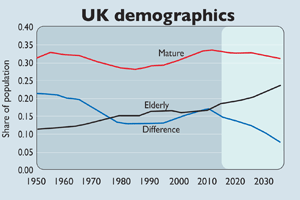A headwind for bonds
A sea change in the age structure of several major economies will have profound implications for markets.

Get the latest financial news, insights and expert analysis from our award-winning MoneyWeek team, to help you understand what really matters when it comes to your finances.
You are now subscribed
Your newsletter sign-up was successful
Want to add more newsletters?

Twice daily
MoneyWeek
Get the latest financial news, insights and expert analysis from our award-winning MoneyWeek team, to help you understand what really matters when it comes to your finances.

Four times a week
Look After My Bills
Sign up to our free money-saving newsletter, filled with the latest news and expert advice to help you find the best tips and deals for managing your bills. Start saving today!
A wide array of factors affect asset prices over the longer term, but demographics are "among the most powerful", says the latest annual Equity Gilt Study from Barclays. That implies that the coming sea change in the age structure of several major economies will have had "potentially profound" implications for markets.
The segment of the population that saves the most into stocks and bonds is the "mature worker", aged around 40-64. Meanwhile, the elderly are more likely to sell their holdings and run down their savings. Since 1980, a steady rise in the proportion of elderly people has been offset by an increase in mature workers worldwide. This has led to a "global savings glut", buoying asset markets.
But now the tide is turning. The study looks at major economies, including Europe, China, Japan and America. The proportion of mature workers is flattening out or declining, and that of elderly spenders is climbing. The upshot is that as the gap between these two categories narrows over the next two decades, "the age structure is projected to become markedly less savings-friendly".
MoneyWeek
Subscribe to MoneyWeek today and get your first six magazine issues absolutely FREE

Sign up to Money Morning
Don't miss the latest investment and personal finances news, market analysis, plus money-saving tips with our free twice-daily newsletter
Don't miss the latest investment and personal finances news, market analysis, plus money-saving tips with our free twice-daily newsletter
Japan has blazed the trail. The savings rate there fell as the working population dwindled in the 1990s. This did not have much impact on Japanese asset prices, which were propped up by savings from the rest of the world. But now that the main developed economies and China are all set for a demographic reversal, the savings glut is set to be soaked up.

The outcome may fall far short of these figures, but even declines of half this size would add up to "a substantial dislocation of the balance between savings and investment".
All this implies a growing long-term headwind for equities. But it constitutes a bigger threat to bonds, which are historically absurdly overpriced, as we noted last week. The link between demographics and asset prices "seems quite inconsistent with market pricing of very low or negative five-year and even ten-year" bonds, as the report puts it.
The ageing population points to lower prices, and higher yields and interest rates, and is therefore another potential pin that could burst the bond bubble.
Get the latest financial news, insights and expert analysis from our award-winning MoneyWeek team, to help you understand what really matters when it comes to your finances.

-
 Should you buy an active ETF?
Should you buy an active ETF?ETFs are often mischaracterised as passive products, but they can be a convenient way to add active management to your portfolio
-
 Power up your pension before 5 April – easy ways to save before the tax year end
Power up your pension before 5 April – easy ways to save before the tax year endWith the end of the tax year looming, pension savers currently have a window to review and maximise what’s going into their retirement funds – we look at how